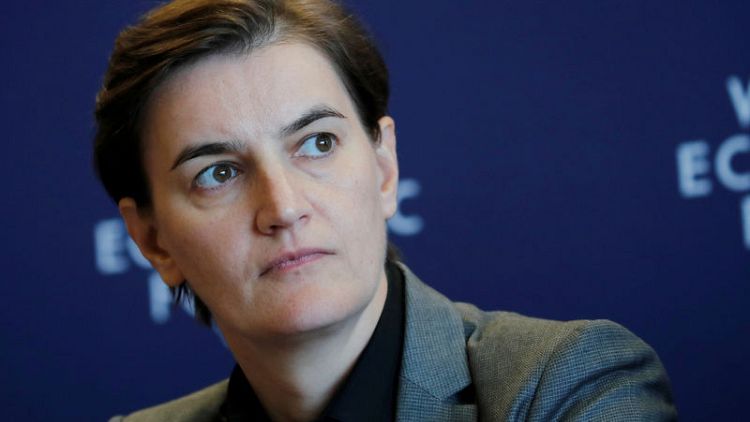BELGRADE (Reuters) - Serbia's premier suggested on Wednesday that any creation of a standing army in Kosovo could provoke military intervention by Belgrade, two decades after Kosovo Albanians' uprising against repressive Serbian rule.
The predominantly ethnic Albanian Kosovo parliament is set to vote on Dec. 14 on transforming its 4,000-strong albeit lightly armed defence force into a regular army.
Though that process could take years, Serbian politicians maintain that a Kosovo army could be used to expel remaining minority Serbs from Kosovo, an accusation denied by Kosovar leaders who rely on European Union and U.S. support in reforms and development of the impoverished, small Balkan state.
"I am hoping we would never have to use it (the army), but this is currently one of options on the table as we do not want to watch this ... ethnic cleansing," Prime Minister Ana Brnabic told reporters in Belgrade.
Balkans analysts said that any action by Serbia's 28,000-strong army against Kosovo is highly unlikely given Belgrade's aspirations to EU links, and that Brnabic remarks appeared to be a sop to Serbian nationalists.
"Brnabic's claims...are in conflict with a recent statement of President Aleksandar Vucic who said that sending the (Serbian) army to Kosovo would lead to direct conflict with NATO," said Milan Karagaca, a former military diplomat and a member of Belgrade's Center for Foreign Policy think-tank.
Relations between Serbia and Kosovo, which declared independence in 2008, remain strained and soured further when Pristina slapped 100 percent tariffs on imports from Serbia on Nov. 21 in apparent retaliation for Belgrade's lobbying against Kosovo's admission to Interpol, the international police group.
Brnabic said the tariff hike would bring trade with Kosovo to a halt, costing Serbia 42 million euros a month. But Vucic said on Tuesday there would be no counter-measures.
The EU has said Belgrade and Pristina must normalise relations and resolve territorial and other outstanding disputes as a condition for progress towards EU membership both seek.
Kosovo's independence came almost a decade after a NATO air war that halted the killing and expulsions of ethnic Albanians by Serbian security forces in a two-year counter-insurgency war. Since then, Kosovo has been recognised by more than 110 countries but not Serbia, five EU member states and Russia.
Although Serbia has a policy of official neutrality, it belongs to NATO's Partnership for Peace Program, while retaining traditional political and security ties with Russia.
(Reporting by Aleksandar Vasovic; Editing by)
